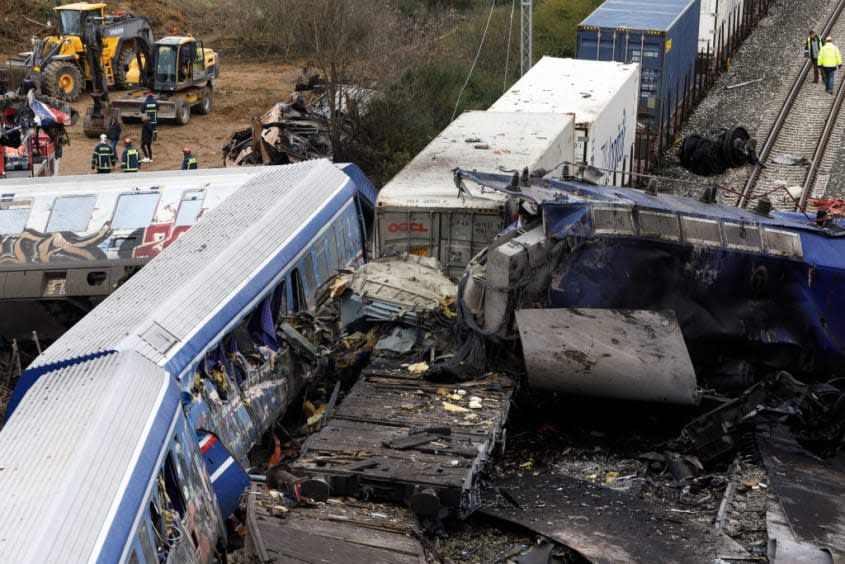What caused the deadly train crash in Greece?

At least 43 people are dead after a passenger train and a freight train collided head-on while traveling through northern Greece. Here's everything you need to know:
What happened?
Reuters reported that the accident happened when a "passenger train collided head-on with a cargo train" as the two traveled against one another on the same track. The resulting collision, which occurred near the Greek city of Larissa, caused a number of cars on both trains to be thrown off the rails.
Eyewitnesses painted a picture of horror at the site of the crash, with Greek newspaper Ta Nea characterizing the scene as "reminiscent of a war zone." Two passengers who managed to escape said "there was oil all over the floor, people were falling while trying to get away. Fortunately, our doors opened, but in the other carriages the doors did not open, [people] were trapped. Some wagons caught fire, it's shocking," they told Ta Nea.
Greek state broadcaster ERT reported that some people were thrown from the trains as they collided, with victims found more than 100 feet from the crash site. As the locomotives crashed, at least one of the cars burst into flames, with victims trapped inside as temperatures within reached 2,300 degrees Fahrenheit, said a Greek fire service spokesperson, per The Associated Press.
Both trains were reportedly traveling at high speeds, though the exact events leading up to the crash are still under investigation.
What caused the trains to collide?
Survivors could provide clues as to what went wrong. One teenager who was aboard the passenger train told The Associated Press that just prior to the crash, he felt strong braking and saw sparks fly from the tracks — then the train car suddenly stopped.
The main question here seems to be: Why were the two trains on the same track — and heading straight for each other — at the same time? Per NPR, the locomotives "appeared to be traveling on a double-track line," which should have allowed them to use separate rails.
Additionally, The New York Times said that "electronic monitoring and warning systems along the track worked only sporadically, in part because of budget problems and in part because the system was not fully operational." The head of the Greek rail workers' union noted that the trains were racing towards each other for at least 12 minutes prior to the crash.
The two freight train drivers died during the accident, while the station master of Larissa was arrested shortly after the crash and charged with negligence. He has denied any wrongdoing, however, and said the collision was likely due to a technical failure.
What happens now?
The accident will undoubtedly raise questions about rail safety in Greece, which has long had a poor record. Calls for railway reform are likely to follow.
A 2022 report from the European Union Agency for Railways cited by CNN found that Greece had "the highest railway fatality rate per million train kilometers from 2018 to 2020 among 28 nations on the continent." Much of this is reportedly due to poor infrastructure on the Greek railways.
Greek Transport Minister Kostas Karamanlis, who resigned the day after the crash, told reporters it was clear that "the Greek railway system [is] in a state that is not up to 21st century standards." Karamanlis added that despite plans to improve these systems, "our efforts have not been sufficient to prevent such a bad incident."
Derek Gatopoulos, an AP reporter in Athens, told NPR's Up First podcast that the debate around Greek rail safety could mirror U.S. anger over the Ohio freight train derailment, which left the town of East Palestine flooded with toxic chemicals.
You may also like
Jurassic-era insect discovered at Arkansas Walmart
Fox News vs. Dominion: 'A watershed of journalistic misdeeds'

